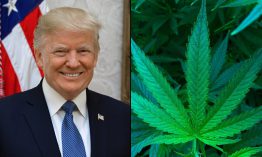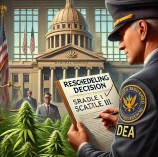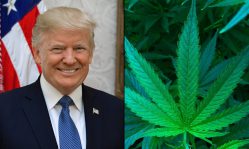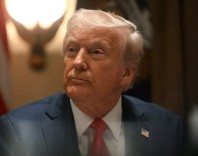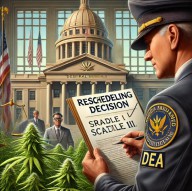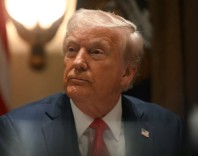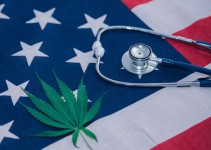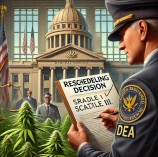
Marijuana Rescheduling
Let’s be honest: Trump tends to do what he wants and get what he wants, regardless of the law. If he truly wanted marijuana to be legal, it likely would be already. So, we should hold him accountable for the outcome.
During his first term, he did nothing meaningful on marijuana policy, and there's little reason to believe things will be different this time around.
Perhaps economic pressures will push him to act—but ultimately, we’ll have to wait and see.
Is the Federal Government Intentionally Dragging Its Feet on Marijuana Reform?

1.
Federal Tax Revenue via 280E
One of the clearest incentives for maintaining marijuana’s current Schedule I status is IRS Code 280E, which:
-
Prohibits cannabis businesses from deducting most normal business expenses (like rent, payroll, advertising).
-
Only allows cost of goods sold (COGS) deductions, resulting in massive federal tax bills.
 Bottom line: Legal cannabis businesses pay 2x to 4x more in federal taxes
than comparable businesses — a quiet but potent source of federal revenue.
Bottom line: Legal cannabis businesses pay 2x to 4x more in federal taxes
than comparable businesses — a quiet but potent source of federal revenue.
➤ Rescheduling to Schedule III would eliminate 280E restrictions, drastically cutting the IRS’s take from cannabis companies.
 2.
2.
Controlled Legal Gray Zone = Maximum Leverage
By keeping cannabis illegal federally — but tolerating state-level legality — the government can:
-
Extract taxes without offering full legal protections or access to services (e.g., banking, interstate commerce).
-
Use federal prosecution selectively as leverage against operators they want to pressure or make examples of.
-
Maintain control over who succeeds in the industry by favoring well-funded or compliant players.
This gray zone essentially acts as a regulatory moat — one that keeps Wall Street out (for now), limits competition, and allows for selective enforcement.
 3.
3.
Political Flexibility
Maintaining the current status gives politicians and agencies:
-
Room to maneuver: They can appeal to reformists by “promising change” while appeasing conservatives by doing nothing.
-
Leverage over reform activists and businesses: Holding out the carrot of legalization/rescheduling to extract concessions (e.g., on equity programs, interstate rules).
 4.
4.
No Legalization = No Full Reform Pressure
If the feds reschedule or legalize:
-
Pressure would mount for full reforms — including:
Interstate commerce (hurting local monopolies).
FDA regulation (which could hurt small businesses).
Criminal justice reparations (expensive and politically contentious).
SAFE Banking would become mandatory, not optional, and open the door to full financial integration.
In other words, delaying reform preserves a profitable, controllable status quo — for both the government and certain entrenched interests.
 So Is It Deliberate?
So Is It Deliberate?
Highly likely — yes, to an extent. Here’s the logic they’re probably operating on:
-
“Why fix a system that generates tax revenue, doesn’t force us to regulate too much, and avoids political risk?”
-
“We can claim we’re being ‘cautious’ and ‘evaluating science’ while quietly profiting from an industry we pretend is illegal.”
 The Cost of Delay
The Cost of Delay
Of course, this approach:
-
Hurts small cannabis businesses (many go under due to taxes and lack of banking).
-
Delays social justice reforms, especially for communities affected by prohibition.
-
Wastes law enforcement resources in states still criminalizing it.
But from a cold policy calculus, that’s a trade-off Washington seems willing to make — for now.
If you’d like, I can dig deeper into:
-
Federal cannabis tax revenue estimates.
-
How much 280E is really worth to the IRS.
-
Who lobbies against full legalization (and why).
Federal Tax Revenue via 280E
One of the clearest incentives for maintaining marijuana’s current Schedule I status is IRS Code 280E, which:
-
Prohibits cannabis businesses from deducting most normal business expenses (like rent, payroll, advertising).
-
Only allows cost of goods sold (COGS) deductions, resulting in massive federal tax bills.
 Bottom line: Legal cannabis businesses pay 2x to 4x more in federal taxes
than comparable businesses — a quiet but potent source of federal revenue.
Bottom line: Legal cannabis businesses pay 2x to 4x more in federal taxes
than comparable businesses — a quiet but potent source of federal revenue.
➤ Rescheduling to Schedule III would eliminate 280E restrictions, drastically cutting the IRS’s take from cannabis companies.
 2.
2.
Controlled Legal Gray Zone = Maximum Leverage
By keeping cannabis illegal federally — but tolerating state-level legality — the government can:
-
Extract taxes without offering full legal protections or access to services (e.g., banking, interstate commerce).
-
Use federal prosecution selectively as leverage against operators they want to pressure or make examples of.
-
Maintain control over who succeeds in the industry by favoring well-funded or compliant players.
This gray zone essentially acts as a regulatory moat — one that keeps Wall Street out (for now), limits competition, and allows for selective enforcement.
 3.
3.
Political Flexibility
Maintaining the current status gives politicians and agencies:
-
Room to maneuver: They can appeal to reformists by “promising change” while appeasing conservatives by doing nothing.
-
Leverage over reform activists and businesses: Holding out the carrot of legalization/rescheduling to extract concessions (e.g., on equity programs, interstate rules).
 4.
4.
No Legalization = No Full Reform Pressure
If the feds reschedule or legalize:
-
Pressure would mount for full reforms — including:
Interstate commerce (hurting local monopolies).
FDA regulation (which could hurt small businesses).
Criminal justice reparations (expensive and politically contentious).
SAFE Banking would become mandatory, not optional, and open the door to full financial integration.
In other words, delaying reform preserves a profitable, controllable status quo — for both the government and certain entrenched interests.
 So Is It Deliberate?
So Is It Deliberate?
Highly likely — yes, to an extent. Here’s the logic they’re probably operating on:
-
“Why fix a system that generates tax revenue, doesn’t force us to regulate too much, and avoids political risk?”
-
“We can claim we’re being ‘cautious’ and ‘evaluating science’ while quietly profiting from an industry we pretend is illegal.”
 The Cost of Delay
The Cost of Delay
Of course, this approach:
-
Hurts small cannabis businesses (many go under due to taxes and lack of banking).
-
Delays social justice reforms, especially for communities affected by prohibition.
-
Wastes law enforcement resources in states still criminalizing it.
But from a cold policy calculus, that’s a trade-off Washington seems willing to make — for now.
If you’d like, I can dig deeper into:
-
Federal cannabis tax revenue estimates.
-
How much 280E is really worth to the IRS.
-
Who lobbies against full legalization (and why).
-------------------------Most Recent Headlines---------------------
4/2/2025 by Terry Hacienda The Mercury News
The White House finally commented.
The administration’s current stance on marijuana reform is marked by inaction, despite campaign promises and earlier signals of support for cannabis-related reforms. A White House official recently confirmed that “no action is being considered at this time” regarding marijuana policy, leaving advocates and industry stakeholders uncertain about the administration’s priorities.
March 12, 2025
More antics from the federal government, and this time it's the FBI. Does the will of the people even matter anymore in this country?
In 2023, Delaware voters overwhelmingly approved recreational marijuana. Now, however, licensed operators are paying a hefty financial price while waiting for sales to begin. The cause of the delay? The FBI – specifically, the fingerprinting and background checks for employees.
In the meantime, it’s the business owners who are left to shoulder the burden.
1/18/2025
Everything you need to know about the rescheduling hearing and it's current status.
It appears that the cannabis industry has an uphill battle. With the DEA strongly oppossed to rescheduling one has to question their reasoning. They are not listening to the American public as poll after poll show they are in favor of the rescheduling. They are not listening to the science as the medical benefits of cannabis has been documented.
They are not listening to the FDA as they have recommended the rescheduling. What are the DEA's motives. Is it religious, is it financial, is it big pharma...etc
12/15/2024
Nearly 70% of the public comments during the DEA’s marijuana comment period supported marijuana rescheduling. So why is the DEA so against it. The DEA’s marijuana hearings began Dec 2. The DEA’s representatives intend to testify regarding eight issues:
1) It’s actual or relative potential for abuse;
2) Scientific evidence of its pharmacological effect, if known;
3) The state of current scientific knowledge regarding the drug or other substance;
4) Its history and current pattern of abuse;
5) The scope, duration, and significance of abuse;
6) What, if any, risk there is to the public health;
7) Its psychic or physiological dependence liability
8) Whether the substance is an immediate precursor of a substance already controlled.”
With the public support so overwhelming for rescheduling why is the DEA so against it. Alcohol can’t be scheduled as class III drug let alone be legal in the eyes of the DEA. The DEA is out of touch with cannabis science and the pulse of the American public.
As a matter of fact gambling can’t meet the criteria above to be a class III substance and yet marijuana is being questioned.
6/11/2025 – PremiumBud.com Editorial
The DEA has inadvertently turned cannabis into a gateway drug—not because of its chemical properties, but because of its messaging.
For decades, the DEA has grouped marijuana alongside substances like heroin, cocaine, LSD, and crack, claiming they are equally dangerous. This narrative is passed down to our children and young adults, who are taught to fear cannabis as much as these far more harmful drugs.
But when a young person eventually tries marijuana and discovers that the dire warnings don’t match reality, a deeper issue arises. The credibility of the DEA—and others who echo these warnings—is called into question.
It’s like a child being told they’ll be burned if they touch a stove, only to touch it and feel no heat. That disconnect erodes trust. If the government exaggerated the risks of marijuana, young people may reasonably wonder: What else are they exaggerating? That’s when the real danger sets in—because unlike cannabis, drugs like heroin and methamphetamine are, in fact, extremely dangerous.
By misrepresenting marijuana, the DEA doesn't just fail to prevent drug use—it risks encouraging it. In this way, the agency becomes part of the problem it seeks to solve.
12/10/2024
What's going on at the DEA regarding the rescheduing of marijuana. HHS recommended cannabis to be rescheduled to a Schedule 3 drug over a year ago.
Studies have shown some medical benefits to marijuana which is a requirement for a Schedule 3. Ironically Alcohol can't meet this standard and it's legal. Who at the DEA is against the rescheduling of cannabis. Do they not relaize that they are making it a GATEWAY drug!
